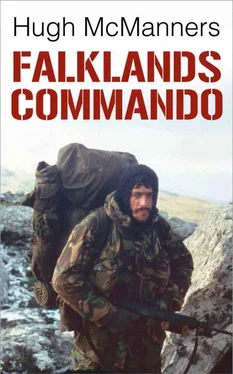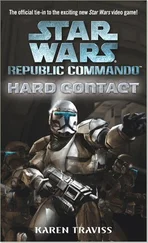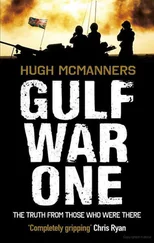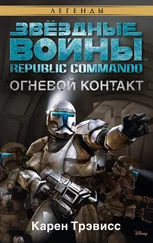Hugh McManners - Falklands Commando
Здесь есть возможность читать онлайн «Hugh McManners - Falklands Commando» весь текст электронной книги совершенно бесплатно (целиком полную версию без сокращений). В некоторых случаях можно слушать аудио, скачать через торрент в формате fb2 и присутствует краткое содержание. Город: London, Год выпуска: 2014, ISBN: 2014, Издательство: Nightstrike Publishing, Жанр: nonf_military, Биографии и Мемуары, на английском языке. Описание произведения, (предисловие) а так же отзывы посетителей доступны на портале библиотеки ЛибКат.
- Название:Falklands Commando
- Автор:
- Издательство:Nightstrike Publishing
- Жанр:
- Год:2014
- Город:London
- ISBN:978-0-992-81540-0
- Рейтинг книги:4 / 5. Голосов: 1
-
Избранное:Добавить в избранное
- Отзывы:
-
Ваша оценка:
- 80
- 1
- 2
- 3
- 4
- 5
Falklands Commando: краткое содержание, описание и аннотация
Предлагаем к чтению аннотацию, описание, краткое содержание или предисловие (зависит от того, что написал сам автор книги «Falklands Commando»). Если вы не нашли необходимую информацию о книге — напишите в комментариях, мы постараемся отыскать её.
Falklands Commando — читать онлайн бесплатно полную книгу (весь текст) целиком
Ниже представлен текст книги, разбитый по страницам. Система сохранения места последней прочитанной страницы, позволяет с удобством читать онлайн бесплатно книгу «Falklands Commando», без необходимости каждый раз заново искать на чём Вы остановились. Поставьте закладку, и сможете в любой момент перейти на страницу, на которой закончили чтение.
Интервал:
Закладка:
On joining the army, many young people find themselves away from home and family for the first time, suffering the homesickness that boarding-school pupils have got out of their systems very early in their lives. In addition, during those first few very demanding months, the nature of their new career emerges in a carefully orchestrated series of exercises and progressions. The most interesting is the least demanding – the formal demonstrations of the military weapons they will be trained to use.
The possibility of having to use real, killing weapons against real people, and having similar weapons firing back should be accepted by every Service person early on in their career. Firepower demonstrations and other events in training bring home the reality of what military weapons are designed ultimately to do, and should have the effect of forcing individuals to think through the real implications of being in the Armed Forces. But this isn’t how these demonstrations are presented, for the understandable reason of not wanting to frighten the recruits.
As is the deliberate intention at military tattoos or Army-style family open days, many recruits watch these demonstrations with glee and excitement, rather than the sober realisation of their weapons’ killing power. It seemed to me, when I was going through this stage at Sandhurst, that individuals who’d been ultra-keen members of school Cadet Corps or Territorial Army units, were more likely to be in the gleeful category. Professional soldiers denigrate such ultra-keenness as being ‘Army barmy’, which I consider a very healthy perspective…
If we were to compare a military career with that of medicine, a significant difference would be that all doctors are certain to encounter death in their work. Medical students must face death very early in their training, to the extent of spending their first term hunched over corpses in the dissecting room. In the process of learning anatomy, they also learn to shut off the grim reality of what they are doing with macabre jokes as the beginnings of a detached, professional manner.
Soldiers in Western peacetime armies, by contrast, may never have shots fired at them in anger, or encounter death. For them, accepting the darker side of their military career is not therefore always necessary. At the start of hostilities in the Falklands, particularly when the Argentine air force began to sink British ships, a significant number of individuals found that being personally involved in a real war was shocking to them, something they’d not expected. After years of carefree military duty (one man I knew had done 22 years in the Navy), they were belatedly having to face up to all the implications of being members of the Armed Forces under the terrifying pressure of real enemy fire.
But ironically this ‘carefree’ peacetime soldiering is stressful in ways that can make real combat seem a release – and almost a relief. The psychology of this is related to the army’s ultimate role. If the aim of peacetime training is clearly understood by everybody to be the realistic preparation for war, individuals can think themselves into the jobs they will have to do, come to terms with the risks and practise with a strong sense of purpose. In those circumstances, life is simple, satisfying and clearly directed.
If, however, individuals think it unlikely that they will ever have to do their jobs in combat, their motivations and perception change. The army becomes a peacetime career for them, with well-defined hurdles to be overcome and promotion as the reward. Life in a ‘career’ army becomes very complicated. Personal motivation can be split two ways: between the logical requirements of the job, and the irrational demands of superiors who must be obeyed and satisfied if the individual is to be promoted. All successful career soldiers must master this essentially political system – as amusingly but often accurately depicted in Sergeant Bilko!
Peacetime armed forces resemble any large organisation, with petty politics and high levels of bureaucratic and social stress. Two additional factors increase the stress beyond that found in civilian life: military rank and commitment. Military rank and authority are absolute, so unlike in a civilian office, there is little effective recourse available to a disgruntled subordinate. Commitment is long term, which forcibly prevents a subordinate from walking out on a superior. But more importantly, good soldiers suffer in silence because they are proud of their units and care about what they are doing.
In peacetime, life in the Armed Forces is a peculiar mixture of military preparedness in the shadow of war, and boredom. This has long been recognised. In the past, when less time was spent on equipment maintenance and large-scale exercises, the officer class in particular was able to revel in sports and games: riding, hunting, shooting, pig-sticking and so on. The use of alcohol is an institutionalised ritual for all ranks in the British Army, to the extent that in some units, not drinking is considered a sign of weakness. The US Armed Forces, by contrast, are particularly strict about not drinking during working hours. Many units do not have a real job to do in peacetime, so they invent activities: inspections, complicated administration, tests and training exercises.
Armed Forces need good people to make them work. Without suitable men and women in the appropriate jobs, and the best leaders out in front, neither technology, nor training, nor sheer force of numbers can win wars. The pyramid shape of any military organisation contains large numbers of low-level leaders who at the same time are also being led by those above them in the structure. The type and quality of military leadership is therefore the single most significant determinant of what one might call the psychological tone of the organisation – the attitudes, lifestyles and social structure within which everybody lives and works.
In all armies, good leaders must also be good followers. In Western armies, there is no clear dividing line between leaders and followers; even the men at the very base of the pyramid structure are considered potential leaders and trained accordingly. Professional, career troops expect promotion at regular intervals, so very soon after leaving basic training each person becomes a leader. Leadership is dynamic and shapes every aspect of life in the Armed Forces, for better and for worse.
The psychology (and tradition) behind the concepts of leadership practised in various armies is fundamental to the way their soldiers are motivated, and to the way they fight. It also determines how the individual reacts to the traumatic experience of combat. Psychological tone is possibly even more important in armies than in navies or air forces because of the numbers of people involved. An army has many more people in its ranks; as individuals they are the weapons with which the war is fought. Navies and air forces use their people to crew ships and aircraft, to operate the technology and service the machinery that does the fighting for them. Individual soldiers must actually be able to kill the enemy. Their discipline, obedience, group cohesion, team spirit, training, all of which create high morale, are determined by leadership, in peacetime as well as in war.
The only product of a peacetime army, navy or air force, apart from the intangible deterring of potential aggressors and the providing of aid to civilian authorities in times of national disaster, is the capacity to select and nurture the right military leaders who will keep the forces up to combat standard in peace, and win battles if war is necessary. One inescapable paradox is that the men who rise to the top in peace are not always the best war leaders. Peacetime armed forces are caught in the dilemma of knowing that many of their leaders may not be cut out for war, but needing to have careful, bureaucratic individuals keeping the military machine ready to fight. Of course there were many excellent peacetime leaders in World War Two: Auchinleck, Wavell, Slim, Dempsey, Horrocks and so on. But the immediate demands of peacetime override those of some future, theoretical war – which everyone hopes in their hearts is never going to happen. Volatile men of outstanding combat ability, like Patton or Montgomery (whose feud with each other would never have been tolerated by a peacetime commander-in-chief), rarely get the chance to prove their worth in peace, being too unpopular with superiors to be promoted. [18]
Читать дальшеИнтервал:
Закладка:
Похожие книги на «Falklands Commando»
Представляем Вашему вниманию похожие книги на «Falklands Commando» списком для выбора. Мы отобрали схожую по названию и смыслу литературу в надежде предоставить читателям больше вариантов отыскать новые, интересные, ещё непрочитанные произведения.
Обсуждение, отзывы о книге «Falklands Commando» и просто собственные мнения читателей. Оставьте ваши комментарии, напишите, что Вы думаете о произведении, его смысле или главных героях. Укажите что конкретно понравилось, а что нет, и почему Вы так считаете.












